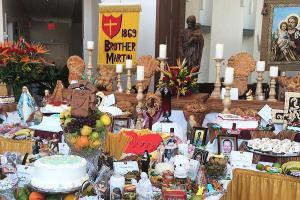
How the Big Easy celebrates St. Joseph
FREE Catholic Classes
Catholic culture is everywhere in New Orleans. Mardi Gras is the city's defining celebration. The city's cathedral is one of its most well-known landmarks. And in the days leading to March 19, the people of New Orleans take up a Catholic tradition that began in the Middle Ages - they build â₏½St. Joseph altars."

Highlights
Catholic Online (https://www.catholic.org)
3/19/2019 (6 years ago)
Published in U.S.
Keywords: the Big Easy, celebrates, St. Joseph
New Orleans, La., (CNA) - In recent years, nearly 60 New Orleans Catholic schools and parishes have constructed annual devotional altars, as an expression of gratitude to St. Joseph, and as a labor of love for parishioners, friends, and neighbors.
"The original [St. Joseph's] altar was built by the people of Sicily in thanks for his prayers to bring an end to their famine," said Sarah McDonald, communications director of Archdiocese of New Orleans.
"Today, they are considered a labor of love. As you are supposed to be working on the altar you are praying to St. Joseph to bless your family and to hear your intentions and pass them on," she told CNA in a 2018 interview.
The tradition began in Sicily, where St. Joseph's intercession is said to have helped the island through a severe famine almost 1,000 years ago. According to legend, people thanked St. Joseph for his prayers by building prayer altars, on which they placed food, pastries, flowers, wine, and, especially, fava beans.
The beans, which are said to pair well with Chianti, were the first crop Sicilians are believed to have grown once their drought ended.
The altars became a custom in Sicily. They came to New Orleans during a wave a Sicilian migration in 19th century.
"In New Orleans we have a very large Sicilian immigrant population coming over in the late 18th century/early 19th century, and with the Sicilian immigrants came the tradition ... of St. Joseph's altars," McDonald said.
McDonald said the altars were first built in people's homes, for celebration with neighbors and families. They have now moved to parishes and are even found in some businesses, including grocery stores and concert venues.
Constructed over several days, the altars typically are made in the shape of a cross, with three tiers to represent the Trinity. A picture of St. Joseph is placed on the top tier. Altars are typically blessed by a priest.
The altars are covered with baked goods, flowers, candles, fruits, vegetables, and meatless meals. Many of the pastries and cookies have a symbolic meaning: some cookies are shaped as carpenter's tools or the Sacred Heart of Jesus.
The food is an expression of gratitude for the local harvest, McDonald said, noting that after the festival canned goods and money are donated to those in need.
To complete the day, many parishes stage a reenactment of the Holy Family's search for shelter in Bethlehem, after which a feast is served.
Called "Tupa Tupa" or "Knock Knock," the custom has children representing the Holy Family knocking on the parish door looking for shelter. Two times the procession is denied shelter, and on the third knock everyone is let in for the feast.
This article was originally published on CNA March 19, 2018.
---
'Help Give every Student and Teacher FREE resources for a world-class Moral Catholic Education'
Copyright 2021 - Distributed by Catholic Online
Join the Movement
When you sign up below, you don't just join an email list - you're joining an entire movement for Free world class Catholic education.
Our Important Lenten Message - Please Watch
- Easter / Lent
- 5 Lenten Prayers
- Ash Wednesday
- 7 Morning Prayers
- Mysteries of the Rosary
- Litany of the Bl. Virgin Mary
- Popular Saints
- Popular Prayers
- Female Saints
- Saint Feast Days by Month
- Stations of the Cross
- St. Francis of Assisi
- St. Michael the Archangel
- The Apostles' Creed
- Unfailing Prayer to St. Anthony
- Pray the Rosary
![]()
Copyright 2026 Catholic Online. All materials contained on this site, whether written, audible or visual are the exclusive property of Catholic Online and are protected under U.S. and International copyright laws, © Copyright 2026 Catholic Online. Any unauthorized use, without prior written consent of Catholic Online is strictly forbidden and prohibited.
Catholic Online is a Project of Your Catholic Voice Foundation, a Not-for-Profit Corporation. Your Catholic Voice Foundation has been granted a recognition of tax exemption under Section 501(c)(3) of the Internal Revenue Code. Federal Tax Identification Number: 81-0596847. Your gift is tax-deductible as allowed by law.







